Fleurs du Mal Magazine


Or see the index
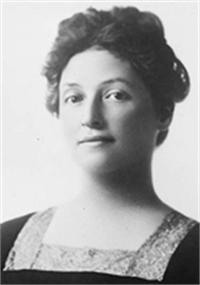
Gladness
Unto my Gladness then I cried:
‘I will not be denied!
Answer me now; and tell me why
Thou dost not fall, as a broken star
Out of the Dark where such things are,
And where such bright things die.
How canst thou, with thy fountain dance
Shatter clear sight with radiance?–
How canst thou reach and soar, and fling,
Over my heart’s dark shuddering,
Unearthly lights on everything?
What dost thou see? What dost thou know?’
My Gladness said to me, bowed below,
‘Gladness I am: created so.’
‘And dare’st thou, in my mortal veins
Sing, with the Spring’s descending rains?
While in this hour, and momently,
Forth of myself I look, and see
Torn treasure of my heart’s Desire;
And human glories in the mire,
That should make glad some paradise!–
The childhood strewn in foulest place,
The girlhood, plundered of its grace;
The eyelids shut upon spent eyes
That never looked upon thy face!
Answer me, thou, if answer be!’
My Gladness said to me:
‘Weep if thou wilt; yea, weep, and doubt.
I may not let the Sun go out.’
Then to my Gladness still I cried:
‘And how canst thou abide?–‘
Here, where my listening heart must hark
These sorrows rising from the Dark
Where still they starve, and strive and die,
Who bear each heaviest penalty
Of humanhood;–nor grasp, nor guess,
The garment’s hem of happiness!–
The spear-wound throbbing in my song,
It throbs more bitterly than wrong,–
It burns more wildly than despair,–
The will to share,
The will to share!
Little I knew,–the blind-fold I,–
Joy would become like agony,–
Like arrows of the Sun in me!
* * * * *
I hold thee here. I have thee, now,–
And I am human. But what art thou!’
My Gladness answered me:
‘Wayfarer, wilt thou understand?–
Follow me on. And keep my hand.’
Josephine Preston Peabody
(1874 – 1922)
Gladness
• fleursdumal.nl magazine
More in: # Classic Poetry Archive, Archive O-P, Archive O-P
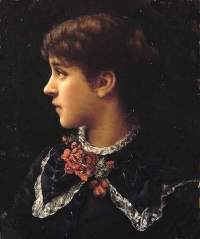
Sérénade
S’il vous fallait un coeur, mignonne,
Un coeur pour vous aimer beaucoup,
Le mien n’appartient à personne,
Il vous aime par dessus tout.
S’il vous fallait un coeur, mignonne,
Un coeur à vous, tout entier
Le mien n’appartient à personne
Un mot de vous peut le lier.
S’il vous fallait un coeur, mignonne,
Un coeur pour vous en amuser
Le mien n’appartient à personne
Il est à vous pour un baiser.
S’il vous fallait un coeur, mignonne,
Un coeur pour après l’oublier
Le mien n’appartient à personne
Vous pouvez le mystifier.
Mais pourtant, sachez-le, mignonne,
Si ce coeur était méprisé
Il ne croirait plus en personne
Car du coup vous l’auriez brisé.
Alice De Chambrier
(1861-1882)
J’aurai vingt ans demain. . .
• fleursdumal.nl magazine
More in: Alice De Chambrier, Archive C-D, Archive C-D, Chambrier, Alice De
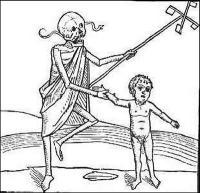
My Baby
He lay on my breast so sweet and fair,
I fondly fancied his home was there,
Nor thought that the eyes of merry blue,
With baby love for me laughing through,
Were pining to go from whence he came,
Leaving my arm empty and heart in pain,
Longing to spread out his wings and fly
To his native home far beyond the sky
They took him out of my arms and said
My baby so sweet and fair was dead,
My baby that was my heart’s delight
The fair little body they robed in white
Flowers they placed at the head and feet
Like my baby fair, like my baby sweet,
They laid him down in a certain place,
And round him they draped soft folds of lace
Till I’d look my last at my baby white,
Before they carried him from my sight,
By the sweet dead babe, so fair to see,
They tried in kindness to comfort me
They said, he is safe from care and pain,
Safe and unspotted by sin or stain;
Before the mystery of the years
Brings heart ache or pang, or sorrow’s tears.
He’s safe, sweet lamb, in the Shepherd’s care,
Sorrow nor suffering enters there;
But with brow of gladness, clothed in light,
He is fair as the angels in His sight.
I know what they said to me was true,
And should have fallen on my heart like dew;
For, although my grief was very sore,
My baby was safe for evermore.
I know that they spoke with kindly care,
My grief to comfort and soothe, or share;
But I gave my baby the last, last kiss,
Saying, God alone comforts grief like this.
Nora Pembroke
(Margaret Moran Dixon McDougall)
1826 – 1898
My Baby
• fleursdumal.nl magazine
More in: - Archive Tombeau de la jeunesse, Archive O-P, Archive O-P, CLASSIC POETRY

Cinderella
Poor, pretty little thing she was,
The sweetest-faced of girls,
With eyes as blue as larkspurs,
And a mass of tossing curls;
But her step-mother had for her
Only blows and bitter words,
While she thought her own two ugly crows,
The whitest of all birds.
She was the little household drudge,
And wore a cotton gown,
While the sisters, clad in silk and satin,
Flaunted through the town.
When her work was done, her only place
Was the chimney-corner bench.
For which one called her “Cinderella,”
The other, “Cinder-wench.”
But years went on, and Cinderella
Bloomed like a wild-wood rose,
In spite of all her kitchen-work,
And her common, dingy clothes;
While the two step-sisters, year by year,
Grew scrawnier and plainer;
Two peacocks, with their tails outspread,
Were never any vainer.
One day they got a note, a pink,
Sweet-scented, crested one,
Which was an invitation
To a ball, from the king’s son.
Oh, then poor Cinderella
Had to starch, and iron, and plait,
And run of errands, frill and crimp,
And ruffle, early and late.
And when the ball-night came at last,
She helped to paint their faces,
To lace their satin shoes, and deck
Them up with flowers and laces;
Then watched their coach roll grandly
Out of sight; and, after that,
She sat down by the chimney,
In the cinders, with the cat,
And sobbed as if her heart would break.
Hot tears were on her lashes,
Her little hands got black with soot,
Her feet begrimed with ashes,
When right before her, on the hearth,
She knew not how nor why,
A little odd old woman stood,
And said, “Why do you cry?”
“It is so very lonely here,”
Poor Cinderella said,
And sobbed again. The little odd
Old woman bobbed her head,
And laughed a merry kind of laugh,
And whispered, “Is that all?
Wouldn’t my little Cinderella
Like to go to the ball?
“Run to the garden, then, and fetch
A pumpkin, large and nice;
Go to the pantry shelf, and from
The mouse-traps get the mice;
Rats you will find in the rat-trap;
And, from the watering-pot,
Or from under the big, flat garden stone,
Six lizards must be got.”
Nimble as crickets in the grass
She ran, till it was done,
And then God-mother stretched her wand
And touched them every one.
The pumpkin changed into a coach,
Which glittered as it rolled,
And the mice became six horses,
With harnesses of gold.
One rat a herald was, to blow
A trumpet in advance,
And the first blast that he sounded
Made the horses plunge and prance;
And the lizards were made footmen,
Because they were so spry;
And the old rat-coachman on the box
Wore jeweled livery.
And then on Cinderella’s dress
The magic wand was laid,
And straight the dingy gown became
A glistening gold brocade.
The gems that shone upon her fingers
Nothing could surpass;
And on her dainty little feet
Were slippers made of glass.
“Be sure you get back here, my dear,
At twelve o’clock at night,”
Godmother said, and in a twinkling
She was out of sight.
When Cinderella reached the ball,
And entered at the door,
So beautiful a lady
None had ever seen before.
The Prince his admiration showed
In every word and glance;
He led her out to supper,
And he chose her for the dance;
But she kept in mind the warning
That her Godmother had given,
And left the ball, with all its charm.
At just half after eleven.
Next night there was another ball;
She helped her sisters twain
To pinch their waists, and curl their hair,
And paint their cheeks again.
Then came the fairy Godmother,
And, with her wand, once more
Arrayed her out in greater splendor
Even than before.
The coach and six, with gay outriders,
Bore her through the street,
And a crowd was gathered round to look,
The lady was so sweet,–
So light of heart, and face, and mien,
As happy children are;
And when her foot stepped down,
Her slipper twinkled like a star.
Again the Prince chose only her
For waltz or tete-a-tete;
So swift the minutes flew she did not
Dream it could be late,
But all at once, remembering
What her Godmother had said,
And hearing twelve begin to strike
Upon the clock, she fled.
Swift as a swallow on the wing
She darted, but, alas!
Dropped from one flying foot the tiny
Slipper made of glass;
But she got away, and well it was
She did, for in a trice
Her coach changed to a pumpkin,
And her horses became mice;
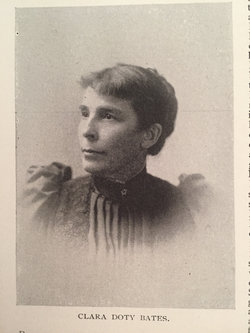
And back into the cinder dress
Was changed the gold brocade!
The prince secured the slipper,
And this proclamation made:
That the country should be searched,
And any lady, far or wide,
Who could get the slipper on her foot,
Should straightway be his bride.
So every lady tried it,
With her “Mys!” and “Ahs!” and “Ohs!”
And Cinderella’s sisters pared
Their heels, and pared their toes,–
But all in vain! Nobody’s foot
Was small enough for it,
Till Cinderella tried it,
And it was a perfect fit.
Then the royal heralds hardly
Knew what it was best to do,
When from out her tattered pocket
Forth she drew the other shoe,
While the eyelids on the larkspur eyes
Dropped down a snowy vail,
And the sisters turned from pale to red,
And then from red to pale,
And in hateful anger cried, and stormed,
And scolded, and all that,
And a courtier, without thinking,
Tittered out behind his hat.
For here was all the evidence
The Prince had asked, complete,
Two little slippers made of glass,
Fitting two little feet.
So the Prince, with all his retinue,
Came there to claim his wife;
And he promised he would love her
With devotion all his life.
At the marriage there was splendid
Music, dancing, wedding cake;
And he kept the slipper as a treasure
Ever, for her sake.
Clara Doty Bates
(1838 – 1895)
Cinderella
Versified by Mrs. Clara Doty Bates
fleursdumal.nl magazine
More in: Archive A-B, Archive A-B, Bates, Clara Doty, Children's Poetry, Grimm, Andersen e.o.: Fables, Fairy Tales & Stories, Tales of Mystery & Imagination
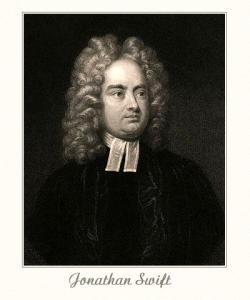
A Love Song
In The Modern Taste
Fluttering spread thy purple pinions,
Gentle Cupid, o’er my heart:
I a slave in thy dominions;
Nature must give way to art.
Mild Arcadians, ever blooming
Nightly nodding o’er your flocks,
See my weary days consuming
All beneath yon flowery rocks.
Thus the Cyprian goddess weeping
Mourn’d Adonis, darling youth;
Him the boar, in silence creeping,
Gored with unrelenting tooth.
Cynthia, tune harmonious numbers;
Fair Discretion, string the lyre;
Sooth my ever-waking slumbers:
Bright Apollo, lend thy choir.
Gloomy Pluto, king of terrors,
Arm’d in adamantine chains,
Lead me to the crystal mirrors,
Watering soft Elysian plains.
Mournful cypress, verdant willow,
Gilding my Aurelia’s brows,
Morpheus, hovering o’er my pillow,
Hear me pay my dying vows.
Melancholy smooth Meander,
Swiftly purling in a round,
On thy margin lovers wander,
With thy flowery chaplets crown’d.
Thus when Philomela drooping
Softly seeks her silent mate,
See the bird of Juno stooping;
Melody resigns to fate.
Jonathan Swift
(1667 – 1745)
A Love Song
In The Modern Taste
1733
• fleursdumal.nl magazine
More in: Archive S-T, Archive S-T, Swift, Jonathan
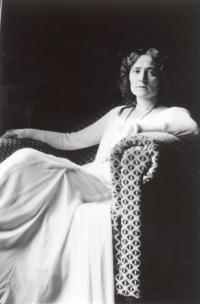
ARMOE
‘k Heb zoo’n honger naar een lied
In dit huis van eenzaam wezen,
Waar ‘k nog in geen blik mocht lezen
Dat een mensch me geren ziet.
‘t Kloksken tikt melankoliek…,
‘t maakt me monotoon en kranke,
God, ik smacht naar dieper klanken,
‘k Heb zoo’n honger naar muziek…
Ach…, En zoo ‘k mezelve sus
Met een blom of een gebêken…
Ziet ge niet mijn lippen smeeken…
‘k Heb zoo’n honger naar een kus!
Leven, dat ik lieven moet,
Leven… kunt ge zoo me laten
Zonder liefde… zonder haten…?
‘k Heb zoo’n honger naar uw gloed.
Alice Nahon
(1896-1933)
Armoe
• fleursdumal.nl magazine
More in: Archive M-N, Archive M-N, Nahon, Alice

J’aurai vingt ans demain . . .
J’aurai vingt ans demain! Faut-il pleurer ou rire?
Saluer l’avenir, regretter le passé,
Et tourner le feuillet du livre qu’il faut lire,
Qu’il intéresse ou non, qu’on aime ou soit lassé?
Vingt ans, ce sont les fleurs toutes fraîches écloses,
Les lilas parfumés dans les feuillages verts,
Les marguerites d’or et les boutons de roses
Que le printemps qui fuit laisse tout entr’ouverts….
Mais c’est aussi parfois l’instant plein de tristesses
Où l’homme, regrettant les jours évanouis,
Au seuil de l’inconnu tout rempli de promesses
Sent des larmes au fond de ses yeux éblouis!
Pareil au jeune oiseau qui doute de son aile
Et n’ose s’élancer hors du nid suspendu,
Il hésite devant cette route nouvelle
Qui s’ouvre devant lui pleine d’inattendu.
L’oeil a beau ne rien voir de triste sur la route;
Malgré le gai soleil, les oiseaux et les fleurs,
Le coeur parfois frissonne et dans le calme écoute
Une lointaine voix qui parle de malheur.
Alice De Chambrier
(1861-1882)
J’aurai vingt ans demain. . .
• fleursdumal.nl magazine
More in: Alice De Chambrier, Archive C-D, Archive C-D, Chambrier, Alice De
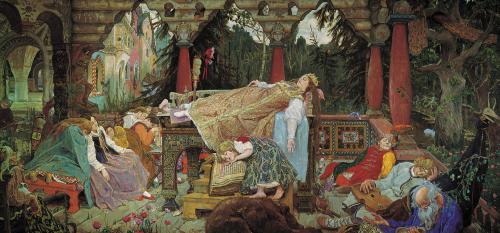
The Sleeping Princess
The ringing bells and the booming cannon
Proclaimed on a summer morn
That in the good king’s royal palace
A Princess had been born.
The towers flung out their brightest banners,
The ships their streamers gay,
And every one, from lord to peasant,
Made joyful holiday.
Great plans for feasting and merry-making
Were made by the happy king;
And, to bring good fortune, seven fairies
Were bid to the christening.
And for them the king had seven dishes
Made out of the best red gold,
Set thickly round on the sides and covers
With jewels of price untold.
When the day of the christening came, the bugles
Blew forth their shrillest notes;
Drums throbbed, and endless lines of soldiers
Filed past in scarlet coats.
And the fairies were there the king had bidden,
Bearing their gifts of good–
But right in the midst a strange old woman
Surly and scowling stood.
They knew her to be the old, old fairy,
All nose and eyes and ears,
Who had not peeped, till now, from her dungeon
For more than fifty years.
Angry she was to have been forgotten
Where others were guests, and to find
That neither a seat nor a dish at the banquet
To her had been assigned.
Now came the hour for the gift-bestowing;
And the fairy first in place
Touched with her wand the child and gave her
“Beauty of form and face!”
Fairy the second bade, “Be witty!”
The third said, “Never fail!”
The fourth, “Dance well!” and the fifth, “O Princess,
Sing like the nightingale!”
The sixth gave, “Joy in the heart forever!”
But before the seventh could speak,
The crooked, black old Dame came forward,
And, tapping the baby’s cheek,
“You shall prick your finger upon a spindle,
And die of it!” she cried.
All trembling were the lords and ladies,
And the king and queen beside.
But the seventh fairy interrupted,
“Do not tremble nor weep!
That cruel curse I can change and soften,
And instead of death give sleep!
“But the sleep, though I do my best and kindest,
Must last for an hundred years!”
On the king’s stern face was a dreadful pallor,
In the eyes of the queen were tears.
“Yet after the hundred years are vanished,”–
The fairy added beside,–
“A Prince of a noble line shall find her,
And take her for his bride.”
But the king, with a hope to change the future,
Proclaimed this law to be:
That, if in all the land there was kept one spindle,
Sure death was the penalty.
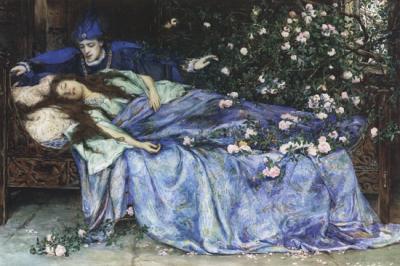
The Princess grew, from her very cradle
Lovely and witty and good;
And at last, in the course of years, had blossomed
Into full sweet maidenhood.
And one day, in her father’s summer palace,
As blithe as the very air,
She climbed to the top of the highest turret,
Over an old worn stair
And there in the dusky cobwebbed garret,
Where dimly the daylight shone,
A little, doleful, hunch-backed woman
Sat spinning all alone.
“O Goody,” she cried, “what are you doing?”
“Why, spinning, you little dunce!”
The Princess laughed: “‘Tis so very funny,
Pray let me try it once!”
With a careless touch, from the hand of Goody
She caught the half-spun thread,
And the fatal spindle pricked her finger!
Down fell she as if dead!
And Goody shrieking, the frightened courtiers
Climbed up the old worn stair
Only to find, in heavy slumber,
The Princess lying there.
They bore her down to a lofty chamber,
They robed her in her best,
And on a couch of gold and purple
They laid her for her rest,
The roses upon her cheek still blooming,
And the red still on her lips,
While the lids of her eyes, like night-shut lilies,
Were closed in white eclipse.
Then the fairy who strove her fate to alter
From the dismal doom of death,
Now that the vital hour impended,
Came hurrying in a breath.
And then about the slumbering palace
The fairy made up-spring
A wood so heavy and dense that never
Could enter a living thing.
And there for a century the Princess
Lay in a trance so deep
That neither the roar of winds nor thunder
Could rouse her from her sleep.

Then at last one day, past the long-enchanted
Old wood, rode a new king’s son,
Who, catching a glimpse of a royal turret
Above the forest dun
Felt in his heart a strange wish for exploring
The thorny and briery place,
And, lo, a path through the deepest thicket
Opened before his face!
On, on he went, till he spied a terrace,
And further a sleeping guard,
And rows of soldiers upon their carbines
Leaning, and snoring hard.
Up the broad steps! The doors swung backward!
The wide halls heard no tread!
But a lofty chamber, opening, showed him
A gold and purple bed.
And there in her beauty, warm and glowing,
The enchanted Princess lay!
While only a word from his lips was needed
To drive her sleep away.
He spoke the word, and the spell was scattered,
The enchantment broken through!
The lady woke. “Dear Prince,” she murmured,
“How long I have waited for you!”
Then at once the whole great slumbering palace
Was wakened and all astir;
Yet the Prince, in joy at the Sleeping Beauty,
Could only look at her.
She was the bride who for years an hundred
Had waited for him to come,
And now that the hour was here to claim her,
Should eyes or tongue be dumb?
The Princess blushed at his royal wooing,
Bowed “yes” with her lovely head,
And the chaplain, yawning, but very lively,
Came in and they were wed!
But about the dress of the happy Princess,
I have my woman’s fears–
It must have grown somewhat old-fashioned
In the course of so many years!
Clara Doty Bates
(1838 – 1895)
The Sleeping Princess
Versified by Mrs. Clara Doty Bates
fleursdumal.nl magazine
More in: Archive A-B, Archive A-B, Bates, Clara Doty, Children's Poetry, Grimm, Andersen e.o.: Fables, Fairy Tales & Stories, Tales of Mystery & Imagination
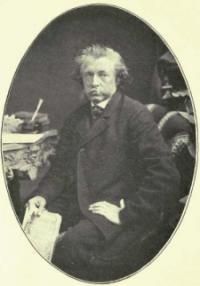
The Dreamer
Spirit of Song! whose whispers
Delight my pensive brain,
When will the perfect harmony
Ring through my feeble strain?
When will the rills of melody
Be widened to a stream!
When will the bright and gladsome Day
Succeed this morning dream?
“Mortal,” the spirit whispered,
“If thou wouldst truly win
The race thou art pursuing,
Heed well the voice within:
And it shall gently teach thee
To read thy heart, and know
No human strain is perfect,
However sweet it flow.
And if thou readest truly,
As surely shalt thou find
That truths, like rills, though diverse,
Are choicest in their kind.
The souls of Poet-Dreamers
Touch heaven on their way;
With the light of Song to guide them
It should be always Day.”
Charles Sangster
(1822 – 1893)
The Dreamer
• fleursdumal.nl magazine
More in: Archive S-T, Archive S-T, CLASSIC POETRY

Sankt Peter und der Blaustrumpf
Ein Weiblein klopft an’s Himmelsthor,
Sankt Peter öffnet, guckt hervor:
– »Wer bist denn du?« – »Ein Strumpf, o Herr …«
Sie stockt, und milde mahnet er:
»Mein Kind, erkläre dich genauer,
Was für ein Strumpf?« »Vergieb – ein blauer.«
Er aber grollt: »Man trifft die Sorte
Nicht häufig hier an unsrer Pforte.
Seid samt und sonders freie Geister,
Der Teufel ist gar oft nicht dreister,
Geh hin! er dürfte von dir wissen,
Der liebe Herrgott kann dich missen.«
– »Das glaub ich wohl – doch ich nicht Ihn,
O Heilger, wolle noch verziehn!«
Sie wagt es, sein Gewand zu fassen,
Hat auf die Knie sich sinken lassen:
»Du starker Hort, verstoß mich nicht,
Laß blicken mich in’s Angesicht
Des Ewgen, den ich stets gesucht.«
– »In welcher Weise, ward gebucht;
Man strebt ihm nach, wie’s vorgeschrieben,
Du bist uns fern und fremd geblieben.«
Das Weib blickt flehend zu ihm auf:
»Wär dir bekannt mein Lebenslauf,
Du wüßtest, daß in selgen Stunden
Ich meinen Herrn und Gott gefunden.«
Der Pförtner stutzt: »Allwo? – Sprich klar!«
– »Daselbst, wo ich zu Hause war,
(Mein Handwerk brachte das mit sich)
Im Menschenherzen. Wunderlich
War dort der Höchste wohl umgeben;
Oft blieb von seines Lichtes Weben
Ein glimmend Fünklein übrig nur
Und führte doch auf Gottes Spur.
Ob er sich nun auf dem Altare
Den Frommen reicher offenbare –
Das zu entscheiden ist dein Amt:
Bin ich erlöst? bin ich verdammt?«
Sankt Peter zu derselben Frist
Etwas verlegen worden ist,
Dacht eine gute Weile nach,
Nahm endlich doch das Wort. Er sprach
Und rückt dabei den Heilgenschein:
»Besprich es drin – ich laß dich ein.«
Marie Ebner-Eschenbach
(1830 – 1916)
Sankt Peter und der Blaustrumpf
• fleursdumal.nl magazine
More in: Archive E-F, Archive E-F, CLASSIC POETRY
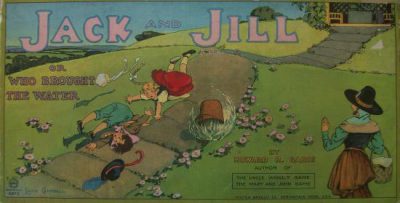
Jack And Jill
Little boys, sit still–
Girls, too, if you will–
And let me tell you of Jack and Jill;
For I think another
Such sister and brother
Were never the children of one mother!
For an idle lad,
As he was, Jack had
No traits, after all, that were very bad.
He, was simply Jack,
With the coat on his back
Patched up in all colors from gray to black.

Both feet were bare;
And I do declare
That he never washed his face; and his hair
Was the color of straw–
You never saw
Such a crop–as long as the moral law!
When he went to school,
It was the rule
(Though ’twas hard to say he was really a fool)
To send him at once,
So thick was his sconce,
To the block that was kept for the greatest dunce.
And Jill! no lass
Scarce ever has
Made bigger tracks on the country grass;
For her only fun
Was to romp and run,
Bare-headed, bare-footed, in wind and sun.
Wherever went Jack,
Close on his track,
With hair unbraided and down her back,
Loud-voiced and shrill,
She followed, until
No one said “Jack” without saying “Jill.”
But to succeed
In teaching to read
Such a harum-scarum, was work indeed!
And I’m forced to tell
That her way to spell
Her name was with only a single ‘l.’
Yet they were content.
One day they were sent
To the hill for water, and they went.
They did not drown,
But Jack fell down,
With a pail in his hand, and broke his crown!
And Jill, who must go
And always do
Exactly as Jack did, tumbled too!
Just think, if you will,
How they rolled down hill–
Straw-headed Jack and bare-footed Jill!
But up Jack got,
And home did trot,
Nor cared whether Jill was hurt or not;
While his poor bruised knob
Did burn and throb,
Tear falling on tear, sob following sob!
He could run the faster,
So a paper plaster
Had bound up the sight of his disaster
Before Jill came;
And the thoughtful dame,
For a break in her head, had fixed the same.
But Jill came in,
With a saucy grin
At seeing the plight poor Jack was in;
And when she saw
That bundle of straw
(His hair) bound up with a cloth, and his jaw
Tied up in white,
The comical sight
Made her clap her hands and laugh outright!
The dame, perplexed
And dreadfully vexed,
Got a stick and said, “I’ll whip her next!”
How many blows fell
I will not tell,
But she did it in earnest, she did it well,
Till the naughty back
Was blue and black,
And Jill needed a plaster as much as Jack!
The next time, though,
Jack has to go
To the hill for water, I almost know
That bothering Jill
Will go up the hill,
And if he falls again, why, of course she will!
Clara Doty Bates
(1838 – 1895)
Jack And Jill
Versified by Mrs. Clara Doty Bates
fleursdumal.nl magazine
More in: Archive A-B, Archive A-B, Bates, Clara Doty, Children's Poetry, Grimm, Andersen e.o.: Fables, Fairy Tales & Stories, Tales of Mystery & Imagination

Judas
By the just vengeance of incensed skies,
Poor Bishop Judas late repenting dies.
The Jews engaged him with a paltry bribe,
Amounting hardly to a crown a-tribe;
Which though his conscience forced him to restore,
(And parsons tell us, no man can do more,)
Yet, through despair, of God and man accurst,
He lost his bishopric, and hang’d or burst.
Those former ages differ’d much from this;
Judas betray’d his master with a kiss:
But some have kiss’d the gospel fifty times,
Whose perjury’s the least of all their crimes;
Some who can perjure through a two inch-board,
Yet keep their bishoprics, and ‘scape the cord:
Like hemp, which, by a skilful spinster drawn
To slender threads, may sometimes pass for lawn.
As ancient Judas by transgression fell,
And burst asunder ere he went to hell;
So could we see a set of new Iscariots
Come headlong tumbling from their mitred chariots;
Each modern Judas perish like the first,
Drop from the tree with all his bowels burst;
Who could forbear, that view’d each guilty face,
To cry, “Lo! Judas gone to his own place,
His habitation let all men forsake,
And let his bishopric another take!”
Jonathan Swift
(1667 – 1745)
Judas
fleursdumal.nl magazine
More in: Archive S-T, Archive S-T, Swift, Jonathan
Thank you for reading Fleurs du Mal - magazine for art & literature